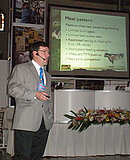J.W. Schroeder, Extension dairy specialist, discussed ways to reduce shrink and other losses in milk production at the Expo Leche 2013 international dairy conference in Aguascalientes, Mexico.
He was one of several national and international researchers, Extension specialists and industry leaders to provide presentations on the latest advances in dairy cattle management, nutrition and production at the April 23-25 conference.
Nearly 500 people, including dairy owners and producers, dairy farm employees, veterinarians, industry service providers and students from Mexico and North and South America attended the 13th annual conference.
In his presentation, titled “Improving Profitability and Feed Efficiency by Reducing Feed Bunk Losses,” he stressed the importance of reducing seemingly invisible losses after feed is delivered to livestock.
He emphasized that total feed waste from storage to consumption by the animals can reach 30 percent with high-forage, high-moisture diets. Although feed waste is regarded as the most significant feed-related losses on the dairy or in the feedlot, methods to quantify feed waste are not well described.
He discussed the many factors affecting waste and acknowledged that determining waste at the feed bunk or feed trough is one of the most difficult areas of feed management. His discussion included eating behavior, feeding environment, feed bunk design, auditing feed losses and guidelines for the use of self-feeders.
Schroeder also noted how management interventions can have unintended consequences in dairy and feed yard profitability. With the likelihood that the cost of feed to produce milk and grow cattle will remain high, managing shrink has become a high priority in all aspects of management.
“Good feed bunk management is more than science; it is an art,” he said. “These skills and principles can be learned but require practice and experience. Cattle are creatures of habit, and disruptions in routine disrupt feed intake and contribute to waste. The critical elements that apply to every feeder include minimizing changes in environment, reducing stress and delivering feed consistently.”
NDSU is recognized as one of the nation’s top 108 public and private universities by the Carnegie Commission on Higher Education.
